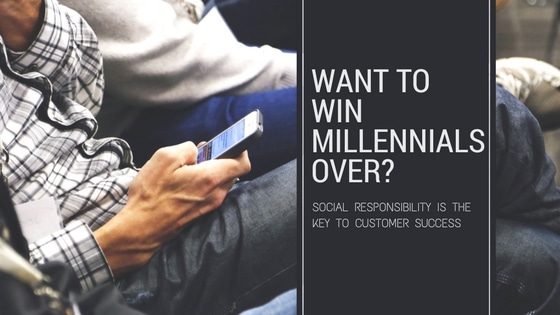One of the basic principles of economics is that people respond to incentives. People buy food to satisfy their hunger. They buy refreshments to quench thirst. They even pay for utilities because we are not in the dark ages and they need internet in their lives.
But not all incentives are physical or tangible. Sometimes the best reward is the knowledge that you are doing something good or that your decision helped save the world, even a little bit.
This is more applicable to customer success than most people believe.
It’s especially true in today’s market. With the Millennials taking over, their purchasing behavior is also affecting how companies need to be marketing themselves. In fact, they currently account for about $1 trillion of the US total current spending.
One of the factors that really define the Millennial market is their strong sense of social justice. According to Horizon Media’s Finger on the Pulse, more than 80% of this demographic believes that companies should not only be good but actually be willing to make a public commitment to showing people their good citizenship. In other words, corporate social responsibility is essential to this generation.
So, what does this mean for businesses? Here are some things you need to consider:
Price is not everything
While optimizing product or service prices may get your company more revenue, it’s not the only consideration for millennials. In a 2015 Nielsen Global Corporate Sustainability Report, they found that 66% of respondents around the world are willing to pay extra for sustainable products and services. This includes developing products with sustainable features like natural/organic ingredients, being environmentally friendly, and proving business commitment to good social values.
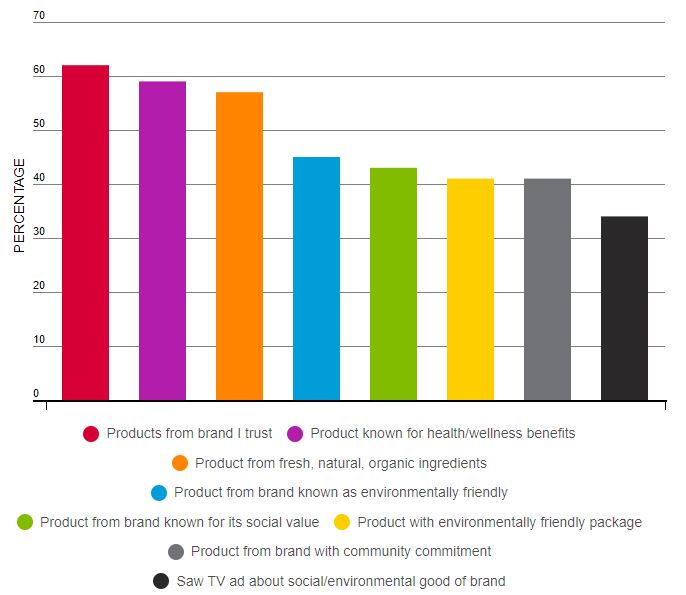
Top Sustainability Purchasing Drivers (image credit: nielsen.com)
This shows that this generation is really putting a premium on social responsibility. Traditional marketing, where savings is the main message, is no longer as appealing as it was before. What the market now wants to hear is that, for a few more bucks, they are getting the product or service they want while contributing to something worthwhile at the same time.
There is a reason why TOMS sell a lot of shoes. Their strong focus on corporate responsibility by using environmentally sound products and improving lives in different parts of the world brings them massive support from the global community.
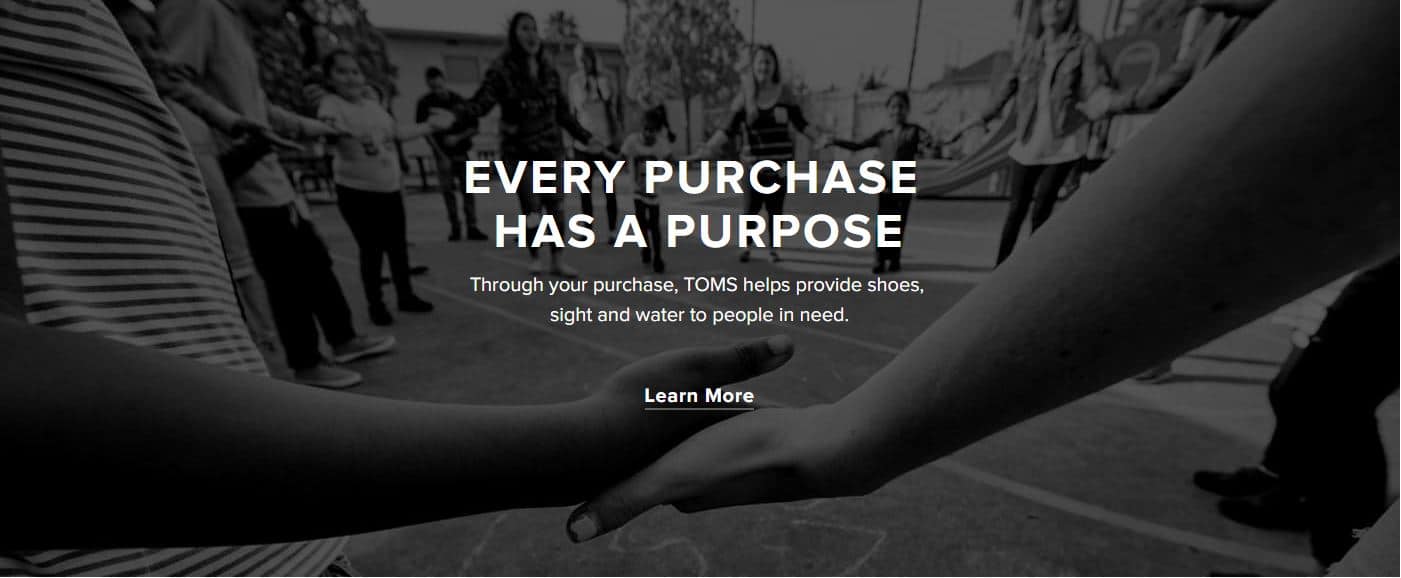
TOMS’ strong focus on corporate responsibility by using environmentally sound products and improving lives in different parts of the world brings them massive support from the global community (photo credit: toms.com)
Their business model is a good example of social entrepreneurship, which aims to effect social change through the use of sustainable business techniques. It involves investing in and organizing businesses that directly address social issues in creative and innovative ways.
This business paradigm is not really new. In fact, we recognized its appeal as far back in 2012 and discussed it in more detail in the blog post “Social Entrepreneurship: Why You Should Make It Your Business.” But a preference for this approach has only gained traction in the last few years.
Faking it won’t help
Some company executives’ first reaction to the Millennials’ emphasis on social responsibility would be to fake it. That is not advisable because the Millennial generation is inherently cynical when it comes to dealing with businesses. Besides, faking it would only bring more negative press once the truth is discovered.
No brands will be mentioned, but there were many companies who have been caught lying about the environment-friendliness of their products or service in the past—and the brand suffered for it.
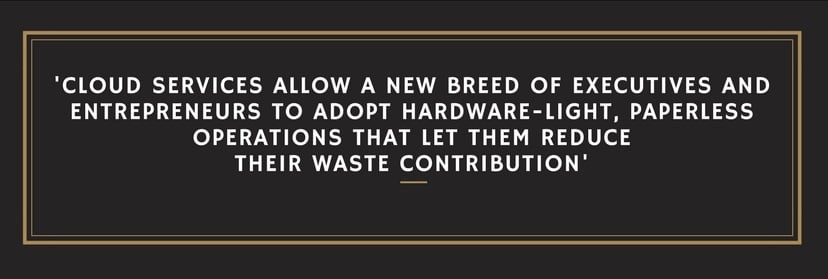
That is the opposite of businesses that deliver true environment-friendly products and services. In fact, that is the reason why a lot of cloud-hosted services are doing well. Aside from requiring little to no capital investment, using solutions like cloud-based telephony allow a new breed of executives and entrepreneurs to adopt hardware-light, paperless operations that let them reduce their waste contribution.
Cloud services are inherently more environment-friendly without having to advertise it, and that is why Millennials support them.
It’s about true sustainable social responsibility
As I said, faking it would not help—but neither will half-hearted attempts at social responsibility.
Making a few donations to a few charities and paying lip service would not cut it. It’s not just about doing occasional charity work either. Millennials care about sustainability. They are not interested in short-term good deeds. They prefer campaigns that aim to make the world better not only in the present but (more importantly) in the future.
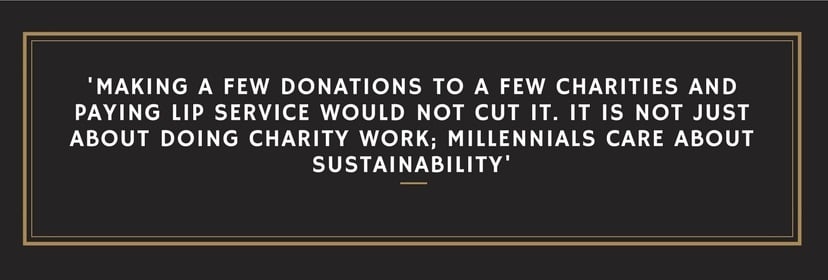
Instead of making token donations, look into social entrepreneurship. Alternatively, consider creating a more concrete social responsibility campaign that can:
- help more people in the long term or
- turn business operations into a more environment-friendly operation
While true corporate social responsibility campaigns can be costly, it does pay off. It will be like hitting two birds with one stone: your business becomes more attractive to the dominant Millennial market, while also contributing to a better world.
You don’t have to be a ruthless businessman to succeed. In today’s market, it pays to be the good guy.
Do you agree that Millennials care about social responsibility and sustainability (or are they just some idealistic spoiled brats)?
Share your thoughts, positive or negative, in the comments below!
Originally published Dec 20, 2017, updated Aug 12, 2020
